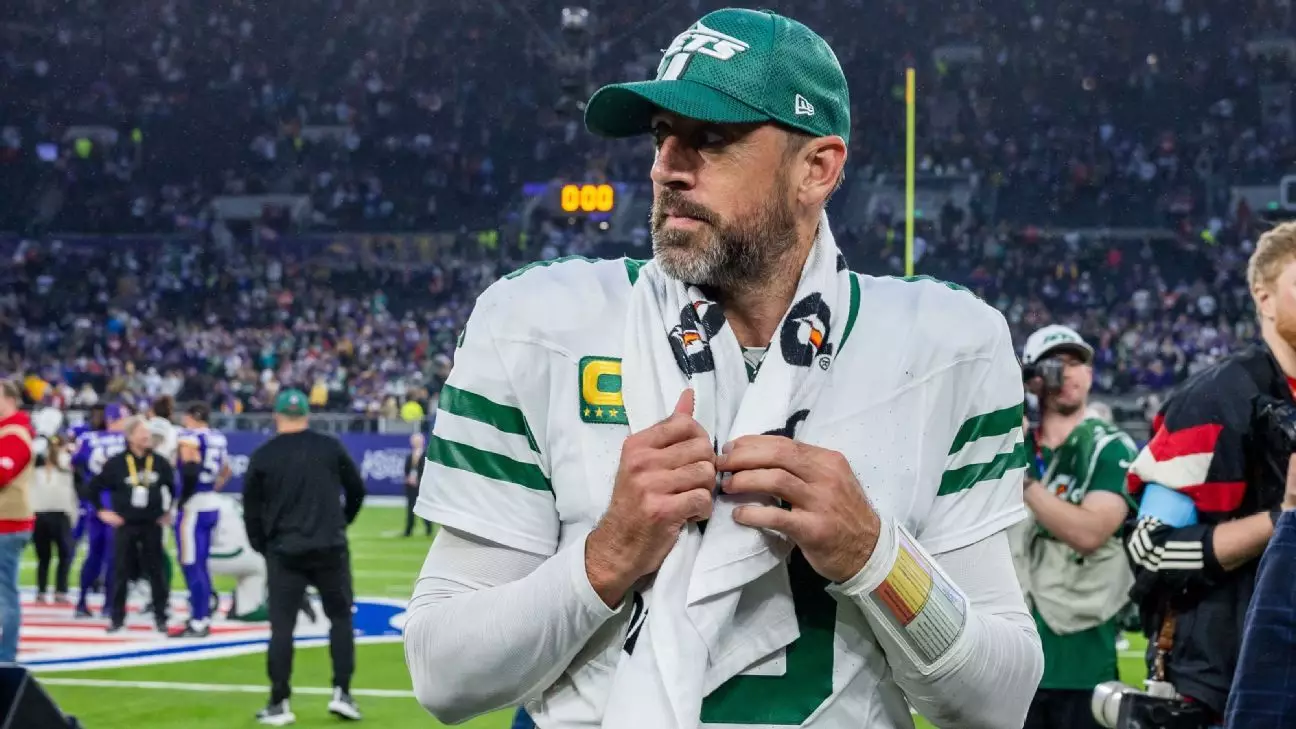The New York Jets have once again found themselves in a whirlwind of controversy and upheaval following the firing of head coach Robert Saleh. As the team adjusts to the interim leadership of Jeff Ulbrich, quarterback Aaron Rodgers has come forward to address accusations of his influence on the coach’s dismissal. This situation raises deeper questions about leadership dynamics, accountability, and how external perceptions can distort the reality within a professional sports organization.
The Jets’ decision to part ways with Saleh after just five games has left many within the organization reeling. Initially brought in to transform a struggling team, Saleh’s tenure, marked by a record of 20 wins and 36 losses, was abruptly cut short. There tends to be speculation that Rodgers, a marquee player with significant media attention, might have played a role in this decision. However, both Rodgers and the team’s players have vehemently denied these claims, illustrating the complexity of interpersonal relationships in high-stakes environments.
Rodgers defended himself during an appearance on “The Pat McAfee Show,” insisting he had no sway over the team’s ownership decisions. “I resent any of those accusations because they are patently false,” he asserted, emphasizing both his respect for Saleh and the misunderstanding of his influence over the franchise’s machinations. By labeling these allegations as “ridiculous,” Rodgers highlights a prevalent issue in sports: the tendency to amplify a star player’s voice at the expense of a nuanced understanding of team dynamics.
With Saleh out, the Jets are now under the guidance of interim coach Jeff Ulbrich, who faces the daunting task of maintaining team morale and performance while implementing necessary changes. Players have indicated that they were taken aback by Saleh’s firing, with tight end Tyler Conklin mentioning that the notion of player backlash against the coach was never discussed. Instead, the focus within the team seems to be on accountability and moving forward in a challenging season.
Rodgers extended his support for Ulbrich, recognizing the need for adjustments in staff. However, the potential for internal strife arises from rumors of a demotion for Nathaniel Hackett, the offensive coordinator and a close friend of Rodgers. The delicate balance between personal relationships and professional responsibilities could complicate the team’s future trajectory.
The Fallout and the Players’ Perspectives
The Jets’ locker room atmosphere is often a reflection of the team’s on-field performance and leadership structure. The abrupt firing of Saleh has not only shocked the coaching staff but also resonated deeply within the player circle. Linebacker C.J. Mosley articulated the sentiment of many in the team, noting his surprise at the termination. During a time when performances have not met expectations, this action raises questions about accountability.
Conklin’s remarks point towards a larger narrative: that even amid a transition, there must be a collective acknowledgment of the shortcomings that led to drastic decisions. The players are aware of the production-based nature of professional sports and recognize that team performance is a shared obligation rather than the sole responsibility of one individual, in this case, Saleh.
Rodgers expressed empathy for Saleh, suggesting there is a shared regret among the players for what didn’t pan out during the season. “It might have been a different story if I had been playing better,” he reflected while discussing how personal performance intertwines with team outcomes. This captures the essence of what it means to be a leader: to bear not only the accolades but also the responsibility for failures.
Moreover, Rodgers shared insights from his conversations with Jets’ owner Woody Johnson, clarifying that discussions surrounding Saleh’s position were not part of their talks. This reiteration serves to clear the air surrounding assumptions of undue influence, while also highlighting the typical reservation that players must navigate regarding the power dynamics within franchises.
As the Jets prepare to face the Buffalo Bills, the atmosphere is charged with mixed emotions. The potential for greatness remains, as the season is still young, and finding a rhythm could stave off further disappointments. However, trust must be rebuilt alongside strategic execution for success to blossom.
In light of these tumultuous events, the New York Jets find themselves at a critical juncture, balancing team cohesion with the pressing need for results. Coaches and players alike must engage in open communication and solidarity to emerge from the shadow of recent upheaval. As the NFL season unfolds, all eyes will be on how the Jets respond to this remarkable test of resilience and adaptability.


Leave a Reply